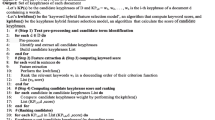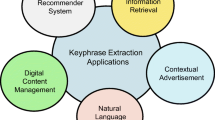Abstract
Keyphrase extraction (KE) is a fundamental task in the information extraction, which has recently gained increasing attention. However, when facing text with complex structure or high noise, current individual keyphrase extraction methods fail to handle capturing multiple features and limit the performance of the keyphrase extraction. To solve that, ensemble learning methods are employed to achieve better performance. Unfortunately, traditional ensemble strategies rely only on the extraction performance (e.g., Accuracy) of each algorithm on the whole dataset for keyphrase extraction, and the aggregated weights are commonly fixed, lacking fine-grained considerations and adaptiveness to the data. To this end, in this paper, we propose an Adaptive Ensemble strategy for Keyphrase Extraction (AEKE) that can aggregate individual KE models adaptively. Specifically, we first obtain the multi-dimensional abilities of individual KE models by employing cognitive diagnosis methods. Then, based on the diagnostic abilities, we introduce an adaptive ensemble strategy to yield an accurate and reliable weight distribution for model aggregation when facing new data, and further apply it to improve keyphrase extraction in the model aggregation. Extensive experimental results on real-world datasets clearly validate the effectiveness of AEKE. Code is released at https://github.com/kingiv4/AEKE.
Access this chapter
Tax calculation will be finalised at checkout
Purchases are for personal use only
Similar content being viewed by others
Notes
References
Blei, D.M., Ng, A.Y., Jordan, M.I.: Latent dirichlet allocation. J. Mach. Learn. Res. 3, 993–1022 (2003)
Boudin, F.: Unsupervised keyphrase extraction with multipartite graphs. In: Proceedings of the 2018 Conference of the North American Chapter of the Association for Computational Linguistics: Human Language Technologies, Volume 2 (Short Papers), pp. 667–672 (2018)
Bougouin, A., Boudin, F., Daille, B.: TopicRank: graph-based topic ranking for keyphrase extraction. In: International Joint Conference on Natural Language Processing (IJCNLP), pp. 543–551 (2013)
Campos, R., Mangaravite, V., Pasquali, A., Jorge, A.M., Nunes, C., Jatowt, A.: A text feature based automatic keyword extraction method for single documents. In: Pasi, G., Piwowarski, B., Azzopardi, L., Hanbury, A. (eds.) ECIR 2018. LNCS, vol. 10772, pp. 684–691. Springer, Cham (2018). https://doi.org/10.1007/978-3-319-76941-7_63
De La Torre, J.: Dina model and parameter estimation: a didactic. Journal of educational and behavioral statistics 34(1), 115–130 (2009)
Devlin, J., Chang, M.W., Lee, K., Toutanova, K.: BERT: pre-training of deep bidirectional transformers for language understanding. arXiv preprint arXiv:1810.04805 (2018)
Ding, H., Luo, X.: AttentionRank: unsupervised keyphrase extraction using self and cross attentions. In: Proceedings of the 2021 Conference on Empirical Methods in Natural Language Processing, pp. 1919–1928 (2021)
Dong, X., Yu, Z., Cao, W., Shi, Y., Ma, Q.: A survey on ensemble learning. Front. Comp. Sci. 14, 241–258 (2020)
Florescu, C., Caragea, C.: PositionRank: an unsupervised approach to keyphrase extraction from scholarly documents. In: Proceedings of the 55th Annual Meeting of the Association for Computational Linguistics (Volume 1: Long Papers), pp. 1105–1115 (2017)
Gallina, Y., Boudin, F., Daille, B.: Large-scale evaluation of keyphrase extraction models. In: Proceedings of the ACM/IEEE Joint Conference on Digital Libraries in 2020, pp. 271–278 (2020)
Ganaie, M.A., Hu, M., Malik, A., Tanveer, M., Suganthan, P.: Ensemble deep learning: a review. Eng. Appl. Artif. Intell. 115, 105151 (2022)
Gao, W., et al.: RCD: relation map driven cognitive diagnosis for intelligent education systems. In: Proceedings of the 44th International ACM SIGIR Conference on Research and Development in Information Retrieval, pp. 501–510 (2021)
Gao, W., et al.: Leveraging transferable knowledge concept graph embedding for cold-start cognitive diagnosis. In: Proceedings of the 46th International ACM SIGIR Conference on Research and Development in Information Retrieval, pp. 983–992
Hasan, K.S., Ng, V.: Automatic keyphrase extraction: A survey of the state of the art. In: Proceedings of the 52nd Annual Meeting of the Association for Computational Linguistics (Volume 1: Long Papers), pp. 1262–1273 (2014)
Hulth, A.: Improved automatic keyword extraction given more linguistic knowledge. In: Proceedings of the 2003 Conference on Empirical Methods in Natural Language Processing, pp. 216–223 (2003)
Kingma, D.P., Ba, J.: Adam: a method for stochastic optimization. arXiv preprint arXiv:1412.6980 (2014)
Liu, C., Yang, L., Gao, W., Li, Y., Liu, Y.: MuST: an interpretable multidimensional strain theory model for corporate misreporting prediction. Electron. Commer. Res. Appl. 57, 101225 (2023)
Liu, Q.: Towards a new generation of cognitive diagnosis. In: IJCAI, pp. 4961–4964 (2021)
Liu, Y., et al.: Technical phrase extraction for patent mining: a multi-level approach. In: 2020 IEEE International Conference on Data Mining (ICDM), pp. 1142–1147. IEEE (2020)
Liu, Y., et al.: TechPat: technical phrase extraction for patent mining. ACM Trans. Knowl. Disc. Data 17, 1–31 (2023)
Liu, Z., Huang, W., Zheng, Y., Sun, M.: Automatic keyphrase extraction via topic decomposition. In: Proceedings of the 2010 Conference on Empirical Methods in Natural Language Processing, pp. 366–376 (2010)
Lord, F.: A Theory of Test Scores. Psychometric Monographs (1952)
Meng, R., Wang, T., Yuan, X., Zhou, Y., He, D.: General-to-specific transfer labeling for domain adaptable keyphrase generation. arXiv preprint arXiv:2208.09606 (2022)
Mihalcea, R., Tarau, P.: TextRank: bringing order into text. In: Proceedings of the 2004 Conference on Empirical Methods in Natural Language Processing. pp. 404–411 (2004)
Papagiannopoulou, E., Tsoumakas, G.: A review of keyphrase extraction. Wiley Interdisc. Rev. Data Min. Knowl. Disc. 10(2), e1339 (2020)
Peterson, L.E.: K-nearest neighbor. Scholarpedia 4(2), 1883 (2009)
Song, M., Feng, Y., Jing, L.: A survey on recent advances in keyphrase extraction from pre-trained language models. In: Findings of the Association for Computational Linguistics, EACL 2023, pp. 2108–2119 (2023)
Sun, S., Liu, Z., Xiong, C., Liu, Z., Bao, J.: Capturing global informativeness in open domain keyphrase extraction. In: Wang, L., Feng, Y., Hong, Yu., He, R. (eds.) NLPCC 2021. LNCS (LNAI), vol. 13029, pp. 275–287. Springer, Cham (2021). https://doi.org/10.1007/978-3-030-88483-3_21
Sun, Y., Qiu, H., Zheng, Y., Wang, Z., Zhang, C.: SIFRank: a new baseline for unsupervised keyphrase extraction based on pre-trained language model. IEEE Access 8, 10896–10906 (2020)
Wan, X., Xiao, J.: Single document keyphrase extraction using neighborhood knowledge. In: AAAI, vol. 8, pp. 855–860 (2008)
Wang, F., et al.: Neural cognitive diagnosis for intelligent education systems. In: Proceedings of the AAAI Conference on Artificial Intelligence, vol. 34, pp. 6153–6161 (2020)
Xiong, L., Hu, C., Xiong, C., Campos, D., Overwijk, A.: Open domain web keyphrase extraction beyond language modeling. In: Proceedings of the EMNLP-IJCNLP 2019, pp. 5175–5184 (2019)
Yue, L., Liu, Q., Du, Y., An, Y., Wang, L., Chen, E.: DARE: disentanglement-augmented rationale extraction. In: Advances in Neural Information Processing Systems (2022)
Zhao, H., Lu, M., Yao, A., Guo, Y., Chen, Y., Zhang, L.: Physics inspired optimization on semantic transfer features: an alternative method for room layout estimation. In: Proceedings of the IEEE Conference on Computer Vision and Pattern Recognition, pp. 10–18 (2017)
Acknowledgements
This research was supported by grants from the National Key Research and Development Program of China (Grant No. 2021YFF0901003).
Author information
Authors and Affiliations
Corresponding author
Editor information
Editors and Affiliations
Rights and permissions
Copyright information
© 2024 The Author(s), under exclusive license to Springer Nature Singapore Pte Ltd.
About this paper
Cite this paper
Jin, X. et al. (2024). Diagnosis Then Aggregation: An Adaptive Ensemble Strategy for Keyphrase Extraction. In: Fang, L., Pei, J., Zhai, G., Wang, R. (eds) Artificial Intelligence. CICAI 2023. Lecture Notes in Computer Science(), vol 14473. Springer, Singapore. https://doi.org/10.1007/978-981-99-8850-1_46
Download citation
DOI: https://doi.org/10.1007/978-981-99-8850-1_46
Published:
Publisher Name: Springer, Singapore
Print ISBN: 978-981-99-8849-5
Online ISBN: 978-981-99-8850-1
eBook Packages: Computer ScienceComputer Science (R0)





